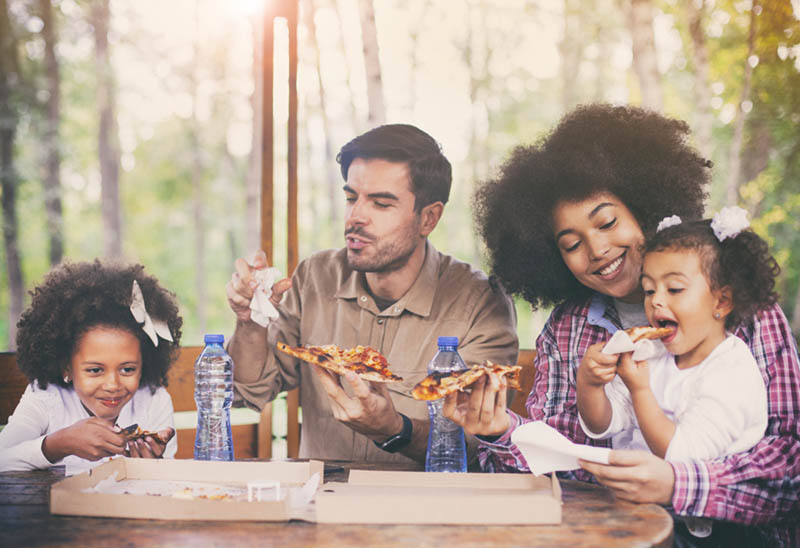Food and Drink Considerations When Traveling

Contaminated food or drinks may cause travelers’ diarrhea and other diseases, which can disrupt your travel. Learn how to incorporate safer eating and drinking habits to reduce your chances of getting sick when you travel. Always wash hands with soap and water before eating and before prepping food. If soap and water are not readily available, you can use an alcohol-based hand sanitizer that contains at least 60% alcohol.
Food Considerations When Traveling
Avoid lukewarm food: Cold food should be served cold, and hot food should be served hot. If you’re selecting food from a buffet or salad bar, make sure the hot food is steaming and the cold food is chilled. Germs that cause food poisoning grow quickly when food is in the danger zone, between 40°F and 140°F.
Dry or packaged foods: Most germs require a damp environment to grow, so foods that are dry, such as potato chips, are usually safe. Additionally, food in factory-sealed containers, such as canned tuna or packaged crackers, are usually safe if they were not opened or handled by another person.
Baby formula: If preparing baby formula, make sure to use a safe source of water per the guidance below. See safety guidance for formula preparation and storage.
Raw foods: Avoid eating raw foods. Fruits or vegetables may be safer to eat if you can peel them yourself or wash them in bottled or disinfected water.
- Stay away from cut-up fruit or vegetables. They may have been contaminated during preparation.
- Avoid eating fresh salads, even if finely cut or shredded. They may be contaminated with human or animal waste that even clean water can’t wash off.
- Avoid fresh salsas, condiments, and other sauces made from raw fruits or vegetables.
- Avoid eating raw meat or seafood, including items “cooked” with citrus juice, vinegar, or other acidic liquid (such as ceviche).
Street food: Avoid eating food from street vendors. If you choose to eat street food, follow the same food safety rules as you would with other foods. For example, avoid raw vegetables and eat food cooked and steaming hot.
Bushmeat: Avoid eating bushmeat. Bushmeat refers to local wild game, generally animals not typically eaten in the United States, such as bats, monkeys, or rodents. Bushmeat can be a source of animal-to-human spread of diseases, such as Ebola.
Drink Considerations When Traveling
Tap water: Do not drink the tap water in countries where the tap water might be contaminated. Avoid swallowing water when showering. Brush your teeth with bottled or disinfected water. Tap water can be disinfected by boiling, filtering, or chemically treating it.
When visiting places with unknown water quality, treat your water to make sure it is safe to drink.
Ice: Do not use ice in destinations with limited access to clean water or where there is a concern about contaminated drinking water because it was likely made with tap water.
Bottled or canned drinks: Drinks from unopened, factory-sealed bottles or cans are safer than tap water; however, use caution as vendors in some countries may replace bottled water with untreated water. Sometimes, a drop of glue can be used to mimic the factory seal. Carbonated drinks in bottles or cans, such as sodas or sparkling water, are typically safe because the bubbles indicate that the bottle was sealed at the factory and not tampered with. Avoid drinks that have ice.
Hot drinks: Hot coffee or tea should be safe if it is served steaming hot. It’s okay to let it cool before you drink. Do not drink coffee or tea that is served warm or at room temperature. Be careful about adding things that may be contaminated to your hot drinks, such as cream or lemon. Sugar is usually okay to eat because it is a dry food.
Milk: Pasteurized milk from a sealed bottle is usually safe to drink. Do not drink milk stored in open containers, such as pitchers, that may have been sitting at room temperature; this includes cream for coffee or tea. Unpasteurized foods carry risks for all travelers; however, it is especially important for pregnant women or people who have a weakened immune system to avoid unpasteurized milk, cheese, and yogurt.
Alcohol: The alcohol content of most liquors kills germs that may have been present in alcohol. When choosing mixers, such as fruit juices, follow the recommendations about what types of food and drink are least likely to have germs. Avoid drinks that have ice.
Fountain drinks: Sodas from a fountain, such as ones in restaurants, are made by carbonating water and mixing it with flavored syrup. Since the water most likely came from the restaurant’s tap, do not drink fountain drinks.
Freshly squeezed juice: Avoid fruit juice, and food and drinks made with freshly squeezed juice made by others. It is fine to drink fruit juice or eat ice pops and other treats if you washed/peeled the fruit in bottled or treated water and squeezed the juice yourself.
More Information